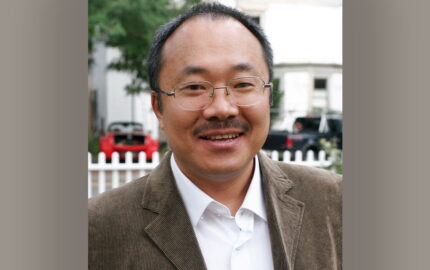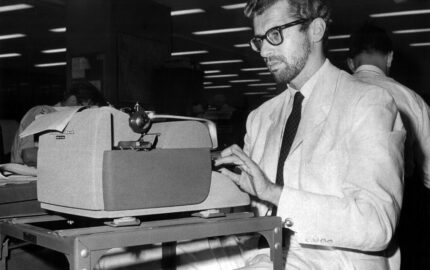CAMBRIDGE, Mass. (June 28, 2001) — In an effort to encourage fairness in newspaper journalism and honor an exemplary example of fairness in news coverage, the former managers of The Boston Globe announced Monday the establishment of the Taylor Family Award for Fairness in Newspapers.
William O. Taylor, chairman emeritus of The Boston Globe, and other members of his family, raised $450,000 to endow an annual prize of $10,000. The award will first be given in 2002, based on work published in daily newspapers during 2001.
The award’s origins go back to 1999 and discussions between Taylor and some of his associates at The Globe, including former editor Tom Winship, former Globe Columnist David Nyhan and former Assistant to the Publisher Timothy Leland, about the importance of recognizing journalism that demonstrates a commitment to fairness and responsibility.
"The First Amendment guarantees a free press, but a free press must also be a responsible press, and that means a press that is fair to both individuals and institutions in the news," Taylor said. "As journalists pursue the truth, they need to do so in a spirit of fairness."
The Nieman Foundation for Journalism at Harvard University will administer the award. A Fairness Award Jury will consider nominations from a panel of 31 distinguished journalists. The nominating panel is a diverse group of journalists, and includes many who have written about fairness and credibility or have participated in news industry examinations of these topics.
Nominators will recommend efforts that, in their judgment, meet the highest standards of fairness. In judging entries, the award jury will consider all aspects of the journalistic process: reporting, writing, editing, headlines, photographs, illustrations and presentation. Nominators may recommend a single story or editorial or commentaries, or a body of work by an individual journalist or a newspaper. The award can go to an individual journalist or to a newspaper or wire service.
There is no definition of fairness in the guidelines for the Taylor Fairness Award nominations. "This is deliberate," explained Bob Giles, curator of the Nieman Foundation. "The standards for fairness in journalism are complex and diverse and not easily defined for this kind of journalism competition. We anticipate there will be many ways to define work that can be held up as exemplary examples of fairness. Nominators will apply their own standards of fairness in newspaper work and provide a rationale for these standards in a nominating form. Over time, we expect to build a valuable base of knowledge about how fairness is perceived by leading journalists."
The summer edition of Nieman Reports, the Nieman Foundation’s quarterly magazine, includes an announcement of the award along with a discussion of fairness by leading journalists Nyhan of the Globe and Bob Haiman, former president of the Poynter Institute and now a Freedom Forum Fellow who wrote a handbook on best practices for journalists on how to be fair to the public. Call (617) 496-6324, to receive a copy or send an e-mail note to: nreports@harvard.edu.
The following is a list of the nominating panel:
Jim Amoss, editor, The (New Orleans) Times-Picayune; Felicity Barringer, media critic, The New York Times; John Costa, editor, the (Bend, Or.) Bulletin; John Dotson, retired publisher, Akron Beacon Journal; Mike Fancher, executive editor, The Seattle Times; Gregory Favre, retired vice president, The McClatchy Company; Sam Fulwood III, metro columnist, The (Cleveland) Plain Dealer; Felix Gutierrez, senior vice president, The Freedom Forum; Bob Haiman, president emeritus, The Poynter Institute; John Haile, retired editor and vice president, The Orlando Sentinel; David Hawpe, editorial director, The (Louisville) Courier-Journal;
Maria Henson, deputy editorial page editor, Austin American Statesman; Ellen Hume, media analyst; Michael Jacobs, editor, Grand Forks (N.D.) Herald; Anne Marie Lipinski, executive editor, The Chicago Tribune; William K. Marimow, editor, The (Baltimore) Sun; Denny McAulliffe, Freedom Forum Native-American journalist in residence, University of Montana; Jim Naughton, president, The Poynter Institute; Jack Nelson, senior correspondent, Washington, D.C. Bureau, Los Angeles Times; Rich Oppel, editor, Austin American-Statesman; Geneva Overholser, syndicated columnist, Washington Post Writers Group;
Mike Pride, editor, Concord (N.H.) Monitor; Eleanor Randolph, editorial board member, The New York Times; Walter Rugaber, retired publisher, The Roanoke (Va.) Times; David Shaw, media critic, Los Angeles Times; Melanie Sill, managing editor, The (Raleigh, N.C.) News & Observer; Frank Sotomayor, assistant director, Minority Editorial Training Program, Los Angeles Times; Will Sutton, deputy managing editor, The (Raleigh, N.C.) News & Observer; Jacqueline Thomas, editorial page editor, The (Baltimore) Sun; Cynthia Tucker, editorial page editor, (Atlanta) Journal and Constitution; Ed Williams, editorial page editor, The Charlotte (N.C.) Observer.
William O. Taylor, chairman emeritus of The Boston Globe, and other members of his family, raised $450,000 to endow an annual prize of $10,000. The award will first be given in 2002, based on work published in daily newspapers during 2001.
The award’s origins go back to 1999 and discussions between Taylor and some of his associates at The Globe, including former editor Tom Winship, former Globe Columnist David Nyhan and former Assistant to the Publisher Timothy Leland, about the importance of recognizing journalism that demonstrates a commitment to fairness and responsibility.
"The First Amendment guarantees a free press, but a free press must also be a responsible press, and that means a press that is fair to both individuals and institutions in the news," Taylor said. "As journalists pursue the truth, they need to do so in a spirit of fairness."
The Nieman Foundation for Journalism at Harvard University will administer the award. A Fairness Award Jury will consider nominations from a panel of 31 distinguished journalists. The nominating panel is a diverse group of journalists, and includes many who have written about fairness and credibility or have participated in news industry examinations of these topics.
Nominators will recommend efforts that, in their judgment, meet the highest standards of fairness. In judging entries, the award jury will consider all aspects of the journalistic process: reporting, writing, editing, headlines, photographs, illustrations and presentation. Nominators may recommend a single story or editorial or commentaries, or a body of work by an individual journalist or a newspaper. The award can go to an individual journalist or to a newspaper or wire service.
There is no definition of fairness in the guidelines for the Taylor Fairness Award nominations. "This is deliberate," explained Bob Giles, curator of the Nieman Foundation. "The standards for fairness in journalism are complex and diverse and not easily defined for this kind of journalism competition. We anticipate there will be many ways to define work that can be held up as exemplary examples of fairness. Nominators will apply their own standards of fairness in newspaper work and provide a rationale for these standards in a nominating form. Over time, we expect to build a valuable base of knowledge about how fairness is perceived by leading journalists."
The summer edition of Nieman Reports, the Nieman Foundation’s quarterly magazine, includes an announcement of the award along with a discussion of fairness by leading journalists Nyhan of the Globe and Bob Haiman, former president of the Poynter Institute and now a Freedom Forum Fellow who wrote a handbook on best practices for journalists on how to be fair to the public. Call (617) 496-6324, to receive a copy or send an e-mail note to: nreports@harvard.edu.
The following is a list of the nominating panel:
Jim Amoss, editor, The (New Orleans) Times-Picayune; Felicity Barringer, media critic, The New York Times; John Costa, editor, the (Bend, Or.) Bulletin; John Dotson, retired publisher, Akron Beacon Journal; Mike Fancher, executive editor, The Seattle Times; Gregory Favre, retired vice president, The McClatchy Company; Sam Fulwood III, metro columnist, The (Cleveland) Plain Dealer; Felix Gutierrez, senior vice president, The Freedom Forum; Bob Haiman, president emeritus, The Poynter Institute; John Haile, retired editor and vice president, The Orlando Sentinel; David Hawpe, editorial director, The (Louisville) Courier-Journal;
Maria Henson, deputy editorial page editor, Austin American Statesman; Ellen Hume, media analyst; Michael Jacobs, editor, Grand Forks (N.D.) Herald; Anne Marie Lipinski, executive editor, The Chicago Tribune; William K. Marimow, editor, The (Baltimore) Sun; Denny McAulliffe, Freedom Forum Native-American journalist in residence, University of Montana; Jim Naughton, president, The Poynter Institute; Jack Nelson, senior correspondent, Washington, D.C. Bureau, Los Angeles Times; Rich Oppel, editor, Austin American-Statesman; Geneva Overholser, syndicated columnist, Washington Post Writers Group;
Mike Pride, editor, Concord (N.H.) Monitor; Eleanor Randolph, editorial board member, The New York Times; Walter Rugaber, retired publisher, The Roanoke (Va.) Times; David Shaw, media critic, Los Angeles Times; Melanie Sill, managing editor, The (Raleigh, N.C.) News & Observer; Frank Sotomayor, assistant director, Minority Editorial Training Program, Los Angeles Times; Will Sutton, deputy managing editor, The (Raleigh, N.C.) News & Observer; Jacqueline Thomas, editorial page editor, The (Baltimore) Sun; Cynthia Tucker, editorial page editor, (Atlanta) Journal and Constitution; Ed Williams, editorial page editor, The Charlotte (N.C.) Observer.


